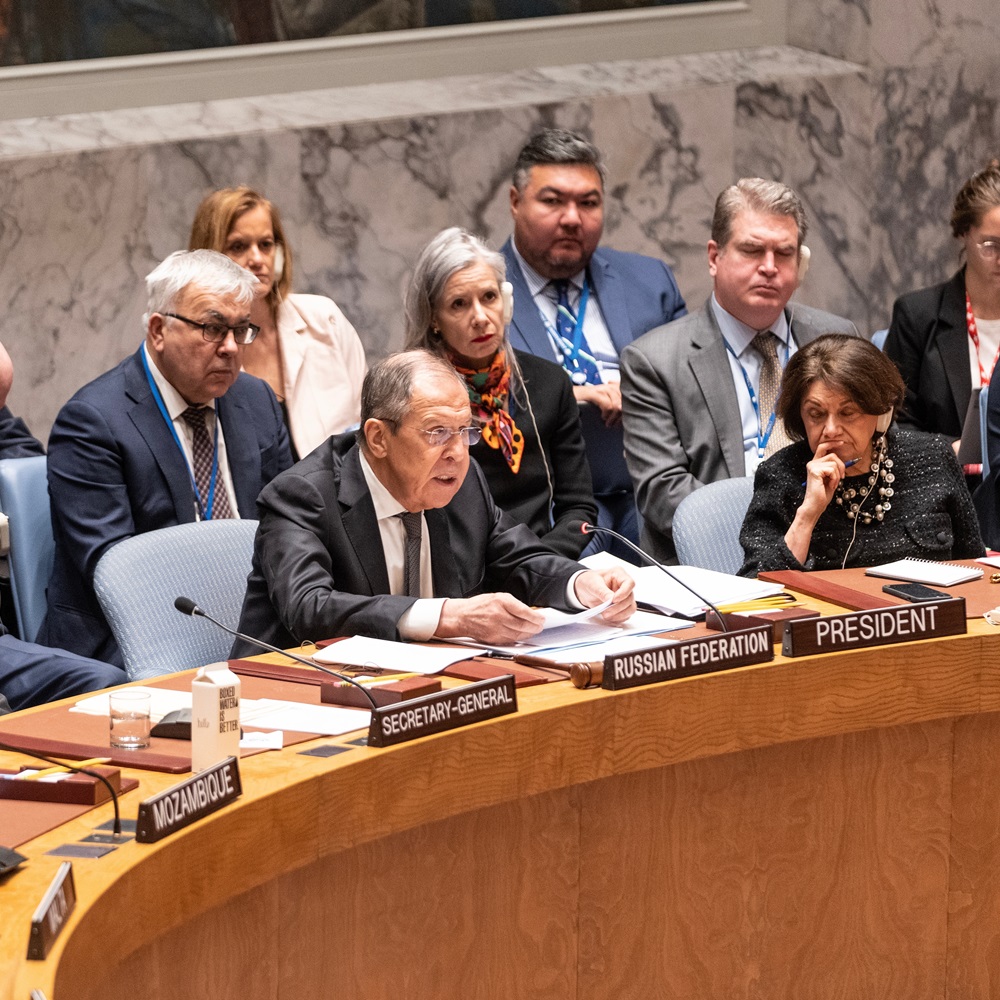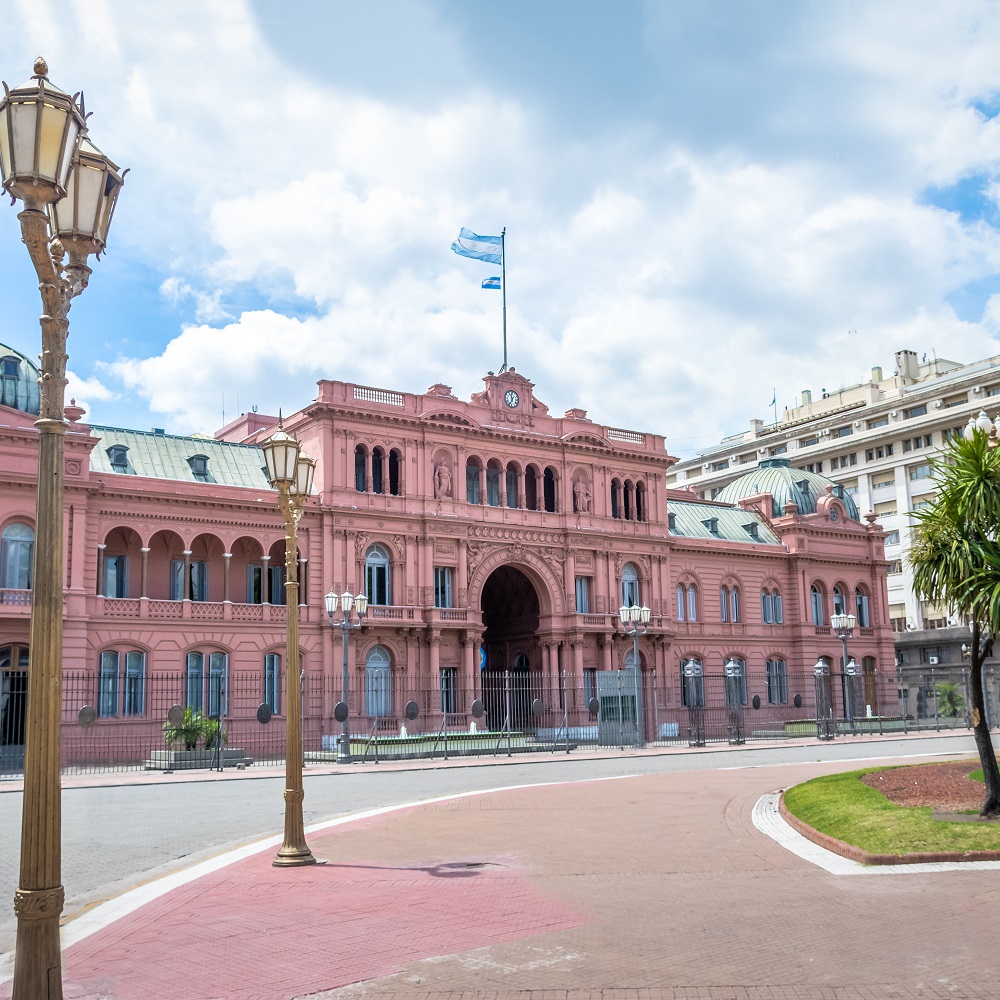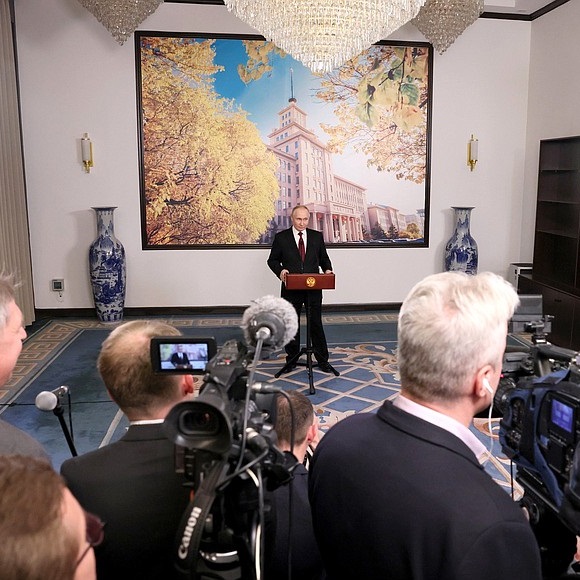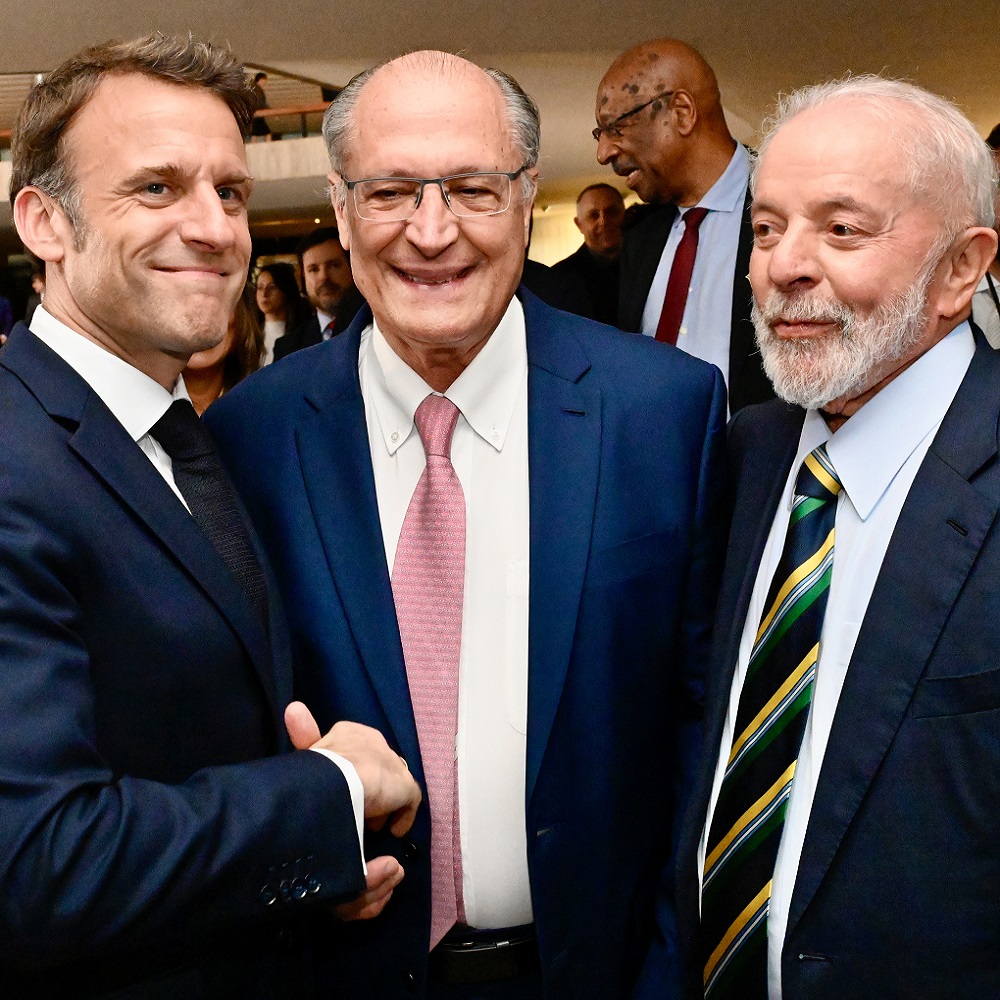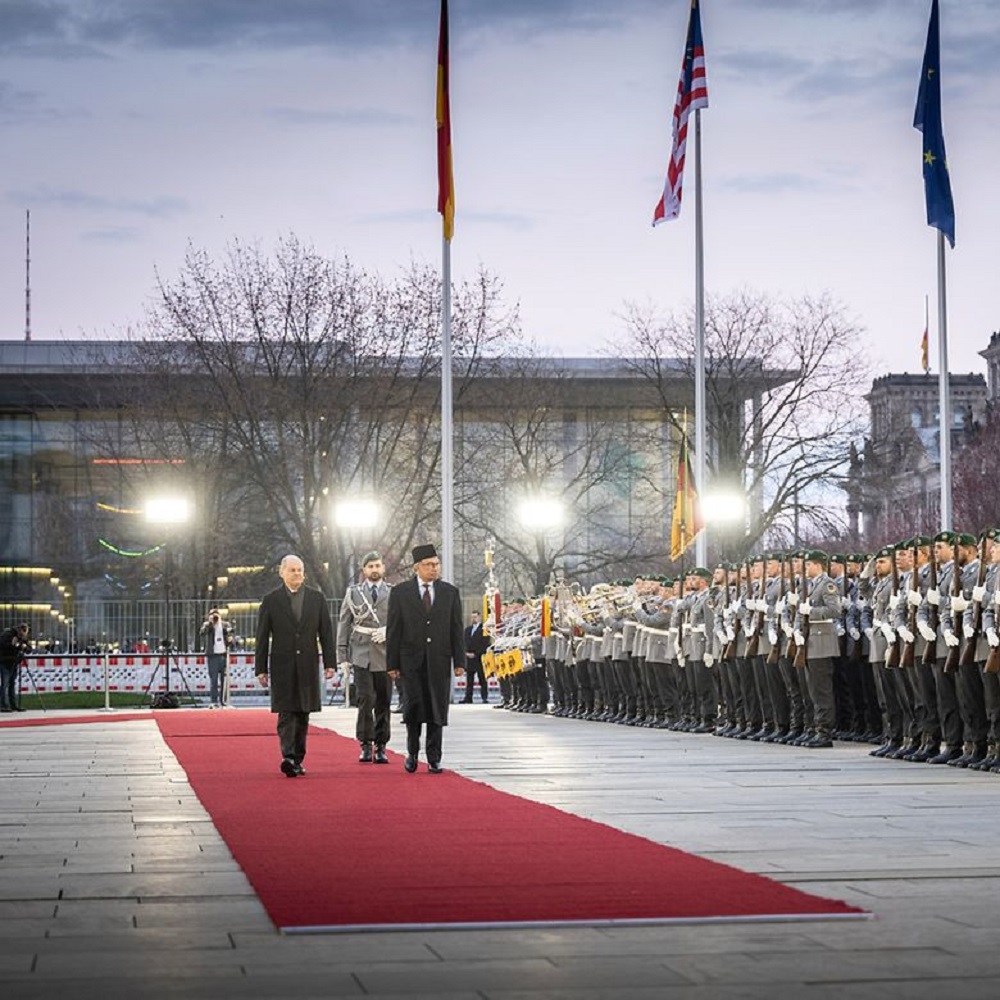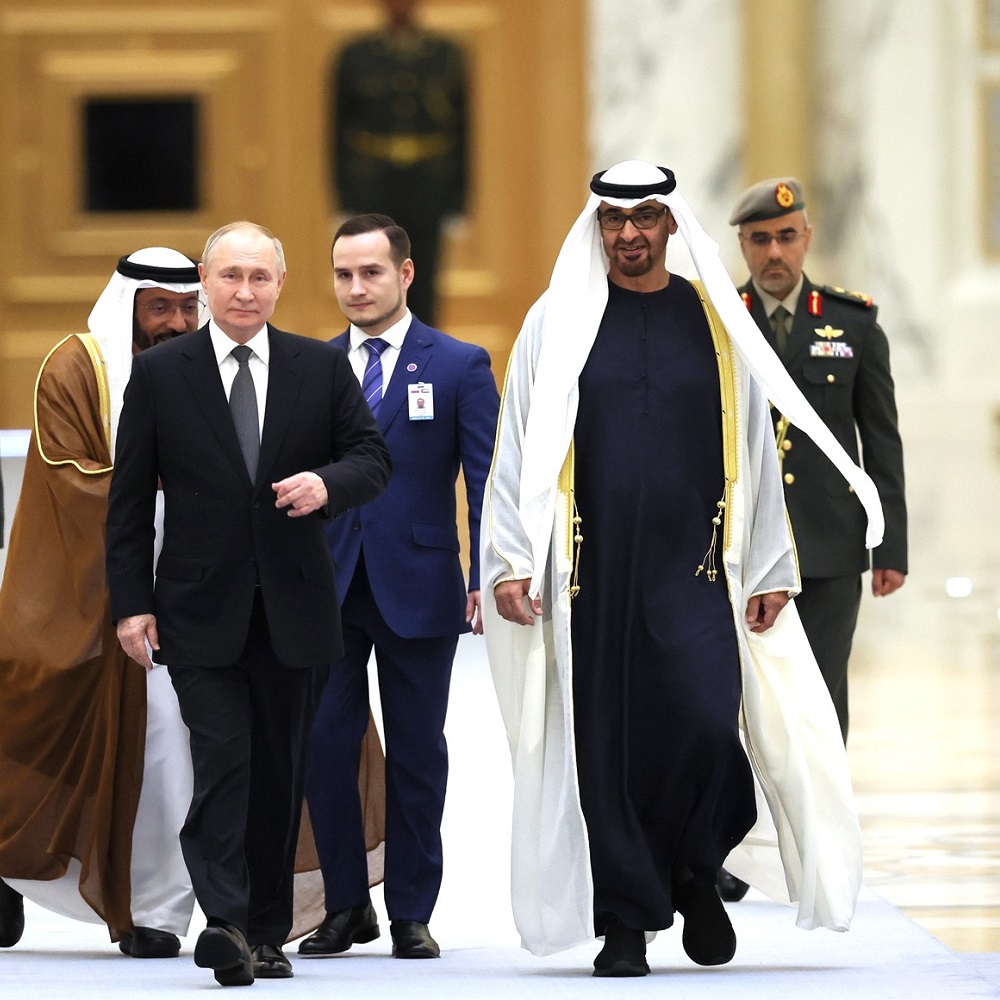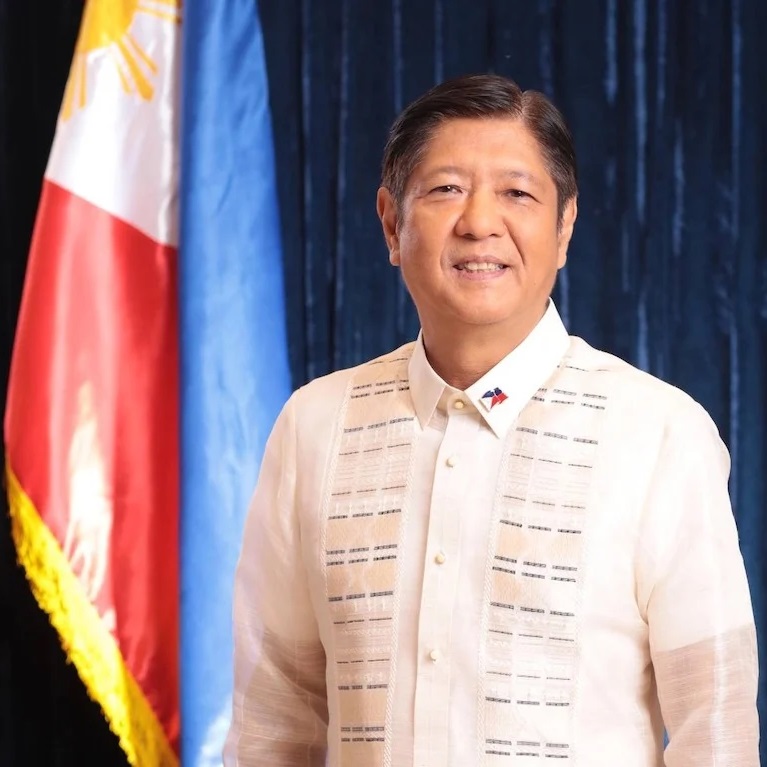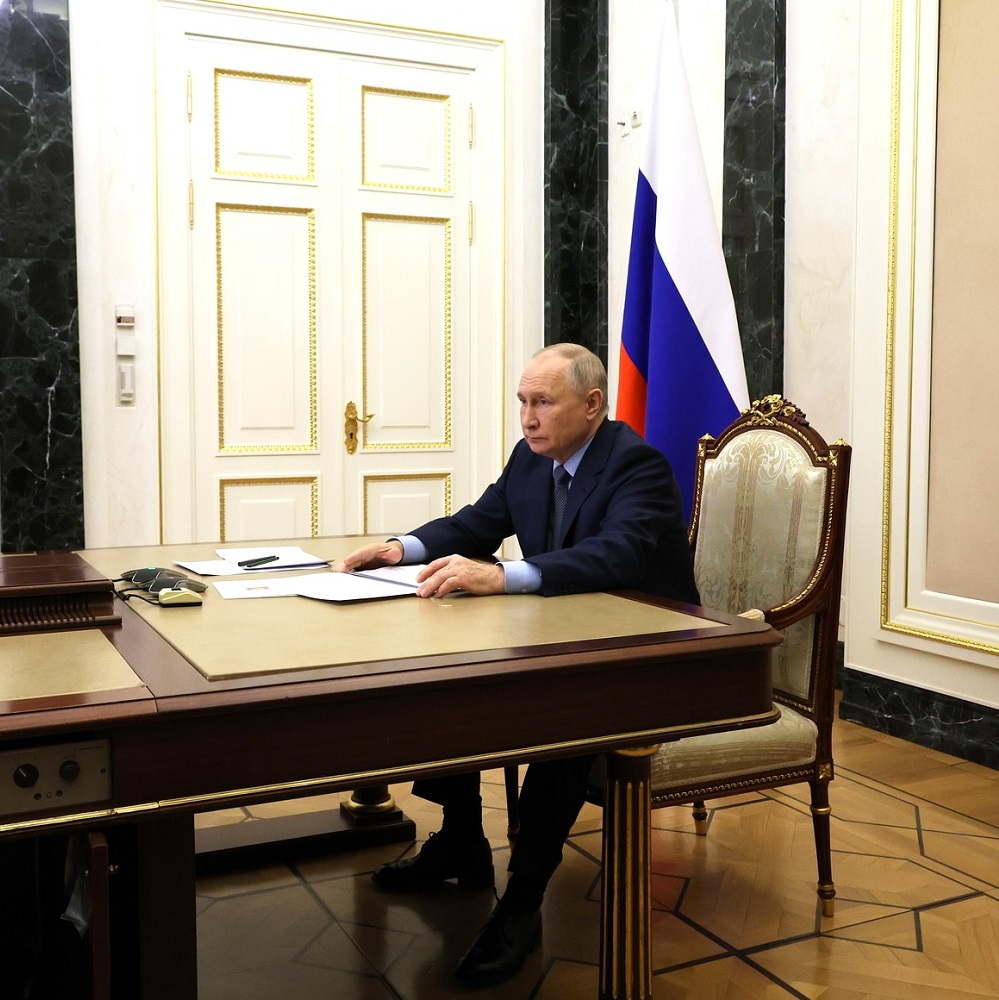Vladimir Putin: Answers to questions from journalists following a visit to China
by Vladimir Putin
한국어로 읽기Leer en españolIn Deutsch lesen
Gap
اقرأ بالعربيةLire en françaisЧитать на русском
Vladimir Putin replied to questions from Russian media representatives on the outcomes of his two-day state visit to the People’s Republic of China.
Question:
It would not be an exaggeration to say that the whole world watched your visit here, as evidenced by a spate of news reports and publications. It is clear that the future of the rapidly changing world largely depends on the positions of Russia and China. Following your talks in China, we would like to know whether Moscow and Beijing have a shared understanding of how the future system of international security and politics should evolve.
Vladimir Putin:
First of all, I would like to thank President of the People’s Republic of China Xi Jinping and the leadership of China for this invitation and for creating a very favourable and warm atmosphere for our joint work.
On the whole, the talks were very meaningful and very substantive.
This was an official state visit, but it was also very much a working trip. From morning until evening, we spent virtually the entire day with the President of China and his colleagues. We raised multiple issues for discussion.
You said that the future depends on Russia and China, but this is only partly true. The future of humankind depends on the whole of humanity. Certainly, Russia and China are important components of modern civilisation. We have our own views on how we should develop. Certainly, our advancement will influence the advancement of all partners on the planet.
We believe that development should be constructive and peaceful, no doubt about it. Apart from our interests, it should heed the interests of all parties to international interaction.
Of course, it is necessary to strengthen the emerging multipolar world. There is absolutely no doubt that a new world is taking shape before our eyes and becoming multipolar. I believe all the people are aware of this. It is important that those who are trying to maintain their monopoly on making decisions on all issues globally should realise this (I believe that they do realise it perfectly well). Understanding this, they should do everything possible to facilitate this natural process. I repeat, this process should be peaceful and conflict-free, with the opinions of all parties to the international process fully considered. All of us should seek compromises while making the difficult decisions that lie ahead.
We are committed to this approach and to precisely this kind of work. I have discussed this repeatedly, and the President of China has also emphasised this: our interaction, cooperation and strategic partnership with China, Russia-China partnership, is not directed against anyone. Our aim is solely to create better conditions for the development of our countries to improve the well-being of the peoples of China and the Russian Federation.
Question:
How did your informal meeting with Xi Jinping go? Your aide said it took place in a super-narrow format but was attended by Defence Minister Andrei Belousov and Security Council Secretary Sergei Shoigu. Did you discuss Ukraine? What would you personally consider convincing evidence of Ukraine’s readiness for talks? Earlier both you and Foreign Minister Sergei Lavrov repeatedly said that the Western partners could no longer be trusted.
Vladimir Putin:
Yes, this meeting took place in the narrow format. We really discussed many issues that are important for bilateral relations.
We discussed the issue of settling the Ukrainian crisis. The President of the PRC told me the main theses of what he discussed during his recent visit to Europe. He set forth his position linked with Chinese peace initiatives. We have said more than once that we believe that China is sincerely striving to settle this problem. It offers different options and is very flexible. I believe it is sincerely striving to resolve this problem. We discussed this at some length.
As for our counter partners, let’s say in this case these are Ukrainian leaders and their European and overseas bosses. Well, we have spoken about this many times.
When our troops stood near Kiev, our Western partners told us: it is impossible to sign documents when the other side puts a gun to your temple. “What should be done?” we asked. “It is necessary to withdraw troops from Kiev.” We did this. On the following day, they threw all our agreements into the dustbin and said: “Now we will fight to the end.” Their Western curators occupied the position that is now known to the whole world – to defeat Russia on the battlefield, to inflict a strategic defeat on it.
It wasn’t us who behaved in this way. These were our partners. Ukrainian officials confirmed this, in particular, the head of the Ukrainian delegation at the talks in Minsk and later in Istanbul, said this. The then Prime Minister [of Great Britain] Mr Johnson came to Kiev and advised Ukraine to continue hostilities. Mr Arakhamia, the head of the Ukrainian delegation, who now leads the ruling parliamentary party in Ukrainian parliament, said that otherwise all hostilities would have been ended a year and a half ago. He said this in public, I believe, at his meeting with journalists. Nobody actually had doubts about this.
So, let’s sum up this part of my answer to your question – we were cheated again. Now we need to understand whom and how we should deal with, whom we should trust and to what extent.
Of course, we are analysing now everything that is taking place in this regard. Of course, we are looking at what is happening around the universally announced meeting in Switzerland, in Geneva. I believe this is the venue of the meeting. We are certainly not going to discuss any formulas about which we know absolutely nothing.
But as distinct from Ukraine, we have never rejected talks. It is they who have quit the negotiating process. They announced that they are going to inflict a strategic defeat on us. It is they who said they were “going to fight to the end,” actually not to the end but to the last Ukrainian. They did everything with their own hands.
We have a foundation for the negotiating process – what we agreed on in Istanbul and a signature of the head of the Ukrainian delegation under an excerpt from this large document. He initialed it. We have this document with his signature on it. What are these other additional terms about which we have never heard and know nothing?
The goal of this event is clear. They want to gather as many countries as possible, declare that everything has been agreed upon with everyone and then present it to Russia as a resolved issue, as an ultimatum. This will never happen.
Question:
Keeping with the theme of Ukraine… Yesterday, Vladimir Zelensky visited Kharkov and held a general headquarters meeting there. At the same time, we are involved in heavy fighting near Kharkov and our troops seem to be gaining success.
Vladimir Putin:
The word “seem” is wrong. They are gaining success. Each day, they advance in strict conformity with the plan.
Question:
What is the plan all about? Are we going to seize Kharkov? Or does our objective consist in creating a sanitary zone, as you said earlier? Thank you.
Vladimir Putin:
I do not know what the head of the Ukrainian state was saying. The only thing I know is that in the final analysis, they are to blame for what is happening. The origin of the current Kiev authorities is the coup d’etat [that occurred in 2014]. This is the source of the present-day authority in Ukraine. This is my first point.
Second, [Kiev’s] Western sponsors allowed the coup to happen by facilitating and orchestrating it. They created the conditions for a smoldering conflict to grow into an armed conflict. They are to blame for this. They are attempting to lay the blame on someone else and make Russia responsible for the current tragic developments. But this is the result of their own policies.
As far as the developments in the Kharkov sector are concerned, they are also to blame for these, because they shelled and, regrettably, continue to shell residential areas in border territories [of Russia], including Belgorod. Civilians are dying there, it’s clear for everyone. They fire missiles right at the city centre, at residential areas. I said publicly that if this continues, we will be forced to create a security zone, a sanitary zone. And this is what we are doing today.
As for [the seizure of] Kharkov, there are no such plans for now.
Question:
It has recently been reported that Chinese banks stopped accepting payment transfers from Russian banks. Did you discuss this issue with the Chinese leader? If so, have you reached an agreement? Have you coordinated a potential scheme of settlements that would be immune from Western sanctions? Thank you.
Vladimir Putin:
Sanctions imposed on third countries engaged in economic activities are doubly or triply illegitimate because sanctions are absolutely illegitimate when adopted without the approval of the UN Security Council. This goes beyond common sense when it comes to third countries.
Incidentally, the Americans or Europeans are even using such sanctions against their own allies. Europeans are not using them against the Americans, but the Americans apply such sanctions against European economic operators and often follow them through not only with regard to Russia but also against other countries in other situation. It is a common practice, and Europeans bear with this, proving yet again their vassal dependence on the sovereign over the sea. Well, whatever!
As for such decisions, they certainly do direct damage to the global economy, not just to the countries they are adopted against or their economic operators, but also to the global economy as a whole, including energy and other spheres of economic operation, and primarily the issues of settlements that are discussed by the economic operators. Solutions are possible, and there are such solutions. Of course, they should be supported at the level of governments, and I hope that this is how it will be.
The reasons behind the behaviour of large financial institutions are understandable: nobody wants to sustain losses because of US actions, even if they are illegal. However, I would like to repeat what I said before: it is silly and a huge mistake of the American political elites because they are inflicting big harm on themselves by undermining trust in the US dollar. They are gradually undermining the status of the dollar as a global settlement and reserve currency, even though they are deriving huge profits from this now. First, they adopted the Bretton Woods system. Then they abandoned the gold standard of the dollar and [formalised a floating exchange rate system under] the Jamaica Agreement. What is it based on? It fully depends on the money printing press, or putting it more gallantly, on the might and quality of the American economy. Yes, this is exactly how things stand.
All countries in the world trust the American economy, its might and stability, which is why they accept the dollars. This gives a huge and seemingly inexplicable advantage to the American economy and financial system. However, it can be presented in figures. According to our economists, it amounts to over 10 trillion dollars that have not been earned but are a gift from heaven that comes from the use of the dollar as a global reserve currency. Overall, the obligations of the US financial system to the rest of the world have been estimated at $53.4 trillion.
However, by undermining trust in the dollar for political reasons, the US authorities are weakening the main and the most powerful and important instrument of their might – the dollar itself. They are doing irreparable damage to themselves. Using one of popular sayings, they are quarrelling with their own bread and butter. This is thoughtless, but they seem unable to stop doing it.
The disadvantage of this for us is that we have to look for other solutions. However, there are also advantages, because it is unacceptable when one side is using financial and economic instruments to force its will on the rest of the world, including on the political stage. I assure you that all countries are aware of this; you only have to look at how fast their dollar-denominated reserves are diminishing. The world is responding. I believe that the [de-dollarisation] process is inevitable.
We have started doing this, and it is a correct process. It entails certain shortcomings and problems, but it is correct in general, when we speak about making settlements in national currencies or creating other settlement instruments jointly with other countries. The process is underway; it has begun, and it cannot be stopped.
Question:
Mr President, let me return to the subject of Ukraine and certain Western initiatives.
You have mentioned yesterday’s lengthy discussion with Xi Jinping on this issue. Could you please tell us whether you touched upon Macron’s initiative to declare an “Olympic truce”? Do you believe an Olympic truce is possible now? Or is this another attempt by the West to lure Russia into a trap, especially amid its military successes? Thank you.
Vladimir Putin:
Yes, President Xi Jinping mentioned this, and we did discuss this issue briefly.
What I think is, first, the principles of Olympism, including the Olympic truce concept, are very sound principles. There is a reason the international community has spent centuries working them out. True, few countries ever invoked this particular principle, with the exception of Ancient Greece, but in general, the idea itself is good and constructive. The issue lies elsewhere. It has to do with the current international sports officials themselves violating the principles of the Olympic Charter. They are politicising sport, which is absolutely unacceptable, because the purpose of sport is to serve as a platform for communication between people and for negotiating compromises on other issues, including political ones.
They are violating their own rules, now with regard to Russia, by excluding our athletes from the Olympic Games, not allowing them to display their flag, anthem, or national colours. They are violating the rules with regard to us, but they want us to comply with the rules that they dictate to us. Has anyone given this a thought? Is this in line with the elementary norms of justice? No. They are violating the rules but they demand that we comply with them. Well, friends, this is not getting us anywhere. No one has ever reached agreement like this. Before demanding anything or expecting others to do something, one needs to follow these rules.
Overall though, sports are certainly progressing, and this progress will continue. I don’t know how the Olympic movement will fare now, with such officials. If they put money first, if money is the only thing that motivates or drives them, if sport becomes a commercial enterprise solely aimed at making a profit, I cannot see a bright future for the Olympic movement.
Look, sport has actually transformed into a for-profit corporation. What is their top priority? To raise money from sponsors and to have large information companies pay for broadcasting. This is just a big business profiting from sporting events. But the principle of Olympism is something else – it is about humanitarian values.
Question:
This week, the US imposed duties on a number of Chinese goods – chips, semi-conductors, metals and solar batteries. Most important, it raised the duty on Chinese electric cars, I believe, four times, up to 100 percent. Can these moves be considered sanctions against China? Is Russia-China cooperation helping counter such attacks?
Vladimir Putin:
Of course, on the surface, they look like sanctions but these are already elements of an economic war to a certain extent. This is not the first time they have been used. Incidentally, I can assure you that politics, the character of Russia-China relations and the situation in Ukraine have nothing to do with this. These are just elements of unfair competition.
We were making an MS-21 aircraft. We agreed on purchasing certain components that we had to put into its wings. These components have nothing to do with military production. They simply denied them to us by including them into a sanctions list. Indicatively, this list was linked with military production whereas the components we wanted had nothing to do with it whatsoever. Yes, we lost time and this production was pushed back by about a year and a half. But eventually, we made these components, these aircraft wing carbon fibre tows. We made them and they are even better than the American ones in quality and durability. The result will be the same in this case.
I have just explained at the meeting with students why such restrictions were introduced against the Chinese auto industry, against electric cars. Just because they have become better and cheaper than European or American ones. That’s it. They are simply killing competitors, in this case, the Chinese rival and do not let it into their market. This is a prohibitive duty. The same is taking place in Europe, of course.
As soon as some country, a global development centre, as we often put it, is developing and becoming more competitive, they stop it and put it down, they try to make it happen.
Can Russia-China cooperation counter this in some way? To prevent this from happening, they are creating problems in financial items because we could purchase more. But we are restricted in purchasing these products because of money transfer problems.
Is it possible to do something about this? Yes, it is. We will develop joint productions. This requires time, just as it was with aircraft components when we had to delay their production by half a year. This is the same case. We will go for joint production.
This is the most erroneous and stupid way of building an international economic system. The correct idea is that the market decides everything and they were drumming it into our heads for decades, if I may put it this way – pardon the fancy language. But the market will still push them down. Do you understand what the point is? They are creating this problem for themselves with their own hands.
What will this lead to? They have introduced sanctions against various goods. What will it lead to? Inflation in the US. This is what they will get. Because they will try to make these products themselves, at their own sites, paying wages to their own workers, paying for their expensive metal and their expensive energy. This is the result – the German economy in Europe is already operating nearly in the red while the French economy is teetering on the brink of recession. If the German economy starts coughing and feels bad, the entire European economy will not feel quite well, putting it mildly. This is the result of such decisions. These are not market decisions. They are completely stupid and have no prospects whatsoever.
Question:
Please, tell us at what conditions you would attend a peace conference on Ukraine in Switzerland if you should receive such an invitation. Thank you.
Vladimir Putin:
Well, politics does not know the subjunctive mood: “if only.” We will not continue. You know what would have happened there in other cases. But there are no “ifs.” They do not invite us. Moreover, they say they cannot imagine us being there. So what will we be [talking] about? “If you do this” looks like we are trying to get invited. “But if you do this, and if this is the case, then we would make these decisions.” Well, if they cannot imagine us being there, so much the better. This is first.
The second, very important thing, is that we are not going to discuss right away what we do not know. As I said, we had been holding painstaking talks for a long time, almost a month and a half; first in Minsk, then in Istanbul, and reached certain compromises. The Ukrainian side signed an abstract of these documents. The package alone is so thick, but the summary with the fundamental issues outlined there were initialed by the Ukrainian side. So, we worked on it. Now there are some formulas but what are they based on? Based on some wishes and not on the real situation. Well, it is impossible to discuss.
However, we are ready for discussion. We never refused. I have just said that, and this is not a joke, I did not make it up. As soon as the troops withdrew, the Westerners immediately told Ukraine: “Do not sign anything. Fight.” They snapped a salute and are following out. While we were immediately told, “Now we will fight to the last man.” This is what we were told. There will be no more talks.
Now they see that they cannot succeed. Perhaps they will be able to fight to the last man but they cannot inflict a strategic defeat on Russia, and they can see that. Now they are beginning to squeak . “Let us urgently convene a conference.” – “Sure.” – “Will Russia participate?” “We are ready to participate in peace talks.” “But we will not invite you.” Here you are, Good Lord, there we go. And Russia is being accused of being reluctant to take part. But we have not been invited.
You are asking: on what conditions? Why should I be proposing terms and asking to let me come where we are not wanted? And what is it that they want to do? Gather as many countries as possible, convince everyone that the terms proposed by the Ukrainian side are the best offer, and then present this to us as an ultimatum, saying, “You see, the whole world thinks so. Thus you must agree.” Is this a way to conduct substantive and serious talks? Of course, not. This is an attempt to impose.
There was an attempt to inflict a strategic defeat, but it failed. The attempt to impose will end the same way.
Remark:
But still, as I see it, your condition is that the agreements reached must be in force.
Vladimir Putin:
Of course. This is the basic condition. They initialed it, but the document was not fully signed. It includes very serious issues related to ensuring Ukraine’s security. They are worded in such a way that requires subsequent consideration. But overall, this is the basis. They have been initialed by the Ukrainian side. I think, not least, probably, if not under the diktat, then with the consent of their Western sponsors. But everything is rigorously worded there regarding their interests.
There is also something that has been taken into account concerning Russia’s security interests. There are a lot of questions there, which I do not want to go into right now. I remember if not all of them but all the main provisions. We are ready to discuss this.
But then they dumped it because they wanted to gain an advantage on the battlefield and achieve a strategic position, which did not work out; so now they are handing out their terms. Have they gone nuts? Why on earth?
Of course, we will proceed from the realities on the ground. This goes without saying.
Question:
My question isabout China and supplies of our hydrocarbons to it.
Has an agreement in principle been reached on the Power of Siberia 2 project? When will construction start: this year or next year? Have there been any talks about a possible increase in supplies?
Vladimir Putin:
Yes. I am not ready to speak about technical details now, but both sides have confirmed their interest in implementing these projects. Since the Chinese economy is growing, it requires, accordingly, more energy resources needed to maintain this growth. Nothing is more reliable (I think this is clear) than supplies from Russia.
We have a huge common border, and no one will interfere here: neither sanctions against the tanker fleet, nor even sanctions against financial institutions. We will buy and sell everything in national currencies. Therefore, the interest on both sides has been reaffirmed. On the one hand, there is interest in receiving additional volumes, on the other hand, there is interest in selling on the Chinese market. This is always a complicated process, involving the question of prices, the question of who will earn and how much. However, strategically we are absolutely interested, both the countries, in implementing these projects, and we will move forward with them.
Gazprom and our oil companies will certainly come to terms. There are different routes. One of them runs via Mongolia, and both gas and oil pipelines can be laid in the same corridor. Specialists will have to decide how best to proceed. It is possible to use the Northern Sea Route. We can buy extra tankers and set up supplies via the Northern Sea Route, which is almost the same as the pipeline. All these alternatives are possible. They are all acceptable and economically expedient. It is necessary to choose the best ones. I am confident that this work will be completed as well.
Question:
My question is also about Ukraine, if I may.
Vladimir Zelensky’s term of office is about to end, it expires on May 20. Will Russia no longer consider him a legitimate president after that date? And would it matter to you, will you be ready to talk to him afterwards?
Vladimir Putin:
We used to talk with him; we were in constant contact with him before the conflict entered the extreme phase of armed struggle.
As for legitimacy, this question must first of all be resolved by the political and legal systems of Ukraine itself. There are all sorts of options in their Constitution. This is a question of assessment. This assessment, of course, should be primarily made by the Constitutional Court and in general, by the political system of Ukraine. But for us, of course, it matters, because if it comes to signing some documents, we certainly will have to sign documents in such a crucial area with the legitimate authorities, this is an obvious fact. But, I reiterate, this question must be answered by the political and legal (juridical) systems of Ukraine itself. Thank you very much.
Question:
Did you discuss with President Xi Jinping the fact that China had been invited to this international conference?
Vladimir Putin:
We discussed this issue as part of the package. Thank you very much for your attention.
Question:
Mr Putin, what about the French army in Ukraine?
Vladimir Putin:
I am not the president of France. Why are you asking me this? I am not the one to make this decision.
Question:
Mr Macron has repeatedly conveyed that he was ready to send troops there. If regular French troops move to Ukraine, will it mean a direct conflict, a war with the French?
Vladimir Putin:
First, you should have him answer your question about the French troops in Ukraine. Once you get the answer, we will start considering the consequences of this step.
Question:
Mr Putin, may I ask about the figure of [Defence Minister Andrei] Belousov? Excuse me, please, this is my last question. Why was Belousov appointed the Defence Minister? We are now at a critical juncture of the special military operation.
Vladimir Putin:
I covered that already. Mr Peskov covered that, too, because I asked him to do so. I will go over it again.
This year, the level of defence spending for the Defence Ministry alone amounted to 6.7 percent of GDP. If you combine that with the amounts spent on law enforcement and security agencies, the total amount will slightly exceed 8 percent. The Defence Ministry accounts for the bulk of the spending meaning that the amount of spending of law enforcement and security agencies depends on how much the Defence Ministry spends. The Defence Ministry is the first to make purchases followed by law enforcement and security agencies. Their choices depend on the Defence Ministry’s choices. In addition, the Defence Ministry is charged with building the national defence system which is does with the enlistment of other security agencies. Their spending depends on that, too.
So, with the Defence Ministry spending 6.7 percent, and the total defence and security spending coming at slightly over 8 percent, this amount of spending is not critical. Defence spending in the Soviet Union in 1985–1986 stood at 13 percent. Taking into account the state of the economy, macroeconomic indicators, and budget revenue forecasts, combined defence and security spending at slightly 8 percent is not critical and is absolutely safe. Experts are even saying it could be larger since the budget is robust enough to handle that. But this level of spending is what we currently have.
As you are aware, Mr Belousov served as the Minister of Economy. He is considered a good economist, one of the best in the country. He was my aide on economic matters. He also served as the First Deputy Prime Minister. In this sense, he is, without a doubt, able to coordinate the Defence Ministry’s work with other ministries and agencies, as well as the regions. This is important as well. I am talking not only about the border regions, but other regions as well, because they, too, to a certain extent, are economic agents. This is my first point.
My second point covers his mission. He must open the Defence Ministry to constructive interaction with the research centres and economic agents in the broad sense of the word, the manufacturers of the military-technical products and components that are needed for the production of military equipment. His job is to open the Defence Ministry to innovation.
Indeed, Mr Shoigu has taken the initial steps towards this end. However, I believe that given his job functions in the recent past, the former Deputy Prime Minister will find it easier to accomplish this. These were the motives behind appointing him to this position.
You all saw Mr Shoigu – it was widely covered – often visit and tour enterprises. He is fully aware of what is going on. He knows what the Armed Forces need in the medium and short term, and knows our industrial capabilities. To a certain extent, he was involved in the contacts with our foreign defence cooperation partners, because the Federal Service for Military-Technical Cooperation was under the Defence Ministry, and he oversaw it.
Considering this, he will have an enormous layer of work to deal with. It is all combined now. If you paid attention, I supported the idea of appointing Mr Manturov First Deputy Prime Minister precisely because we plan to focus the administrative resources on achieving the main objective facing the country today which is gaining the special military operation results that we need.
Thank you very much.










